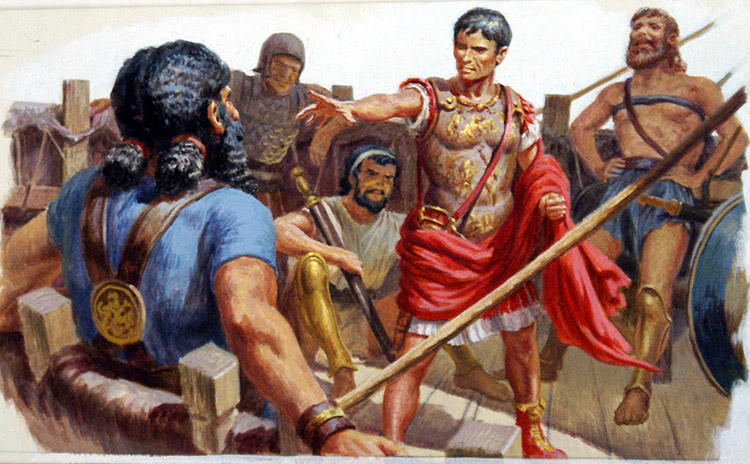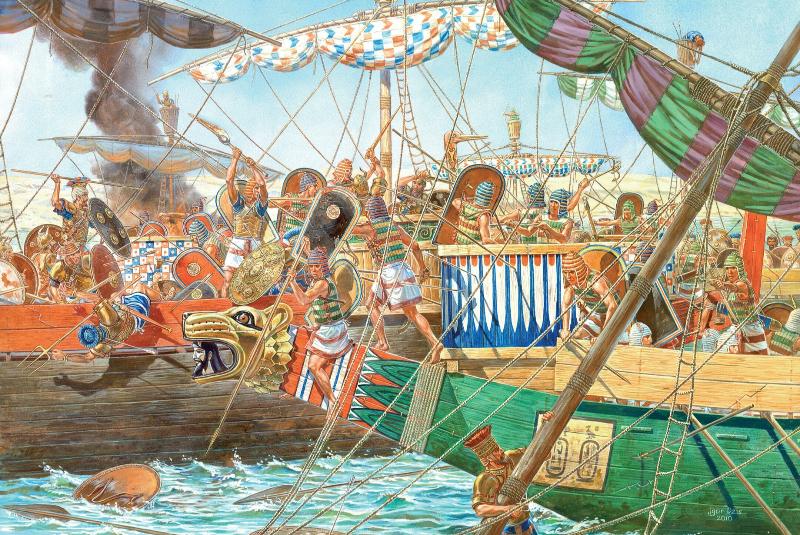In the annals of history, Julius Caesar stands as a colossus, a figure whose life and deeds have inspired countless tales and scholarly studies. The great Roman emperor is often remembered for his military brilliance and political acumen. Still, there's a lesser-known anecdote that illustrates not only his courage and cunning but also his astonishing self-assurance. At the tender age of 25, long before he became the storied conqueror and statesman, Julius Caesar found himself embroiled in an extraordinary episode—a kidnapping at sea that would seem more at home in a daring adventure novel than in the sober pages of recorded history.
The Aegean Sea, nestled between the landmasses of Greece and Anatolia, was Caesar's unlikely stage for this episode. This part of the Mediterranean, known for its sparkling blue waters and as a nexus of burgeoning civilizations, also had a darker aspect. It was infested with the scourge of the ancient seas: pirates. These were not the quaint, rum-loving rogues of modern pop culture, but rather ruthless marauders seeking fortune at the expense of the unfortunates who crossed their path.
Sicilian Pirates: A Menace of the Mediterranean
In this treacherous seascape, Sicilian pirates reigned supreme. Their notoriety was well-earned; they were adept at identifying and capturing the wealthiest and most influential individuals of the age. To them, Julius Caesar, a scion of a noble family, presented the perfect prize. As the young Roman sailed unsuspectingly across the Aegean, he was seized by these pirates, who, sensing opportunity, demanded a hefty ransom for his release.
According to the ancient chronicler Plutarch, these pirates set the ransom at 20 talents of silver, a considerable sum by any measure. In today's market, such a weight of silver—approximately 620 kilograms—would translate to a staggering $600,000. But here, at this moment of apparent vulnerability, Caesar's indomitable spirit shone through. He did not just acquiesce to their demands; he challenged them. Laughing at the sum they requested, Caesar claimed he was worth much more than what they asked for—no less than 50 talents of silver.

The pirates, likely amused and enticed by the prospect of an even larger ransom, agreed to his audacious counter-offer. Thus, Caesar dispatched his attendants to gather the silver, a task so enormous that it took them 38 days. During this time, Caesar remained in the pirates' custody, accompanied only by a skeleton retinue of personal servants.
Caesar Among the Pirates: A Study of Leadership in Captivity
What transpired next is as remarkable as it is indicative of Caesar's character. Instead of succumbing to despair or rage, he reportedly adopted an air of command among his captors. With an almost imperious disregard for his situation, Caesar ordered the pirates about, instituting a bizarre reversal of roles. He demanded silence during his repose and even recited poetry and participated in games, his captors seemingly content to indulge the whims of their illustrious prisoner.
This period of captivity offers a fascinating glimpse into Caesar's leadership style, a foreshadowing of the ruler he would become. He displayed an unwavering confidence and a capacity to assert dominance, traits that would later underpin his rule over Rome.
Retribution: A Promise Fulfilled
But Caesar's story does not conclude with the payment of the ransom and his subsequent release. True to his word and to the amazement—or perhaps horror—of the pirates, he mounted a swift and merciless campaign of retribution once freed. Gathering a fleet, Caesar returned to the scene of his humiliation with the full force of Roman vengeance.
The pirates, perhaps incredulous that a former captive would dare to retaliate, had not fled. Caesar seized them, reclaiming his silver and delivering justice in a manner both brutal and customary for the era—he crucified them.
Legacy of the Incident
This startling narrative offers more than just a dramatic tale of adventure. It is emblematic of the complexities and contradictions of Caesar's personality. On one hand, it showcases his charisma and unshakeable sense of self-worth. On the other, it reveals a ruthless streak that foreshadowed his later conduct in warfare and politics.
In retrospect, this episode can be seen as a crucible for Caesar's developing leadership abilities. The encounter with the pirates tested his resourcefulness, his ability to influence others, and his strategic thinking—qualities he would hone to an unparalleled degree in the years to come.
The kidnapping also serves as a poignant reminder of the precariousness of power. Caesar, at that time a young nobleman, would one day hold the Roman world in his grasp, only to meet a tragic end that bore echoes of his own merciless treatment of the pirates. It’s a stark illustration of how fortune's wheel turns, lifting men to great heights before casting them down.
In the end, the anecdote of Julius Caesar and the Sicilian pirates transcends its historical context, capturing the imagination of posterity. It speaks to the universal themes of ambition, power, and retribution—themes that continue to resonate throughout the corridors of time.




